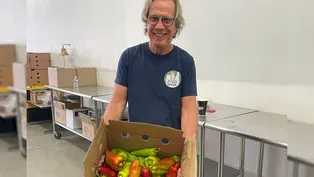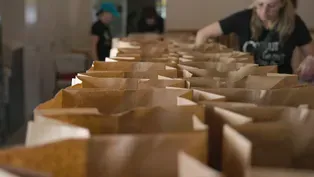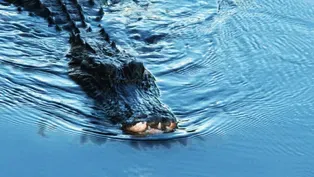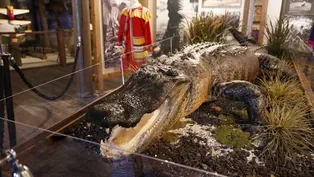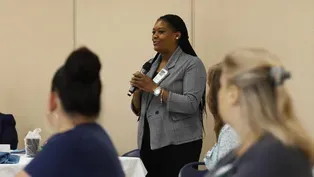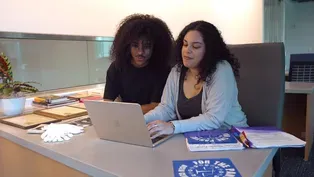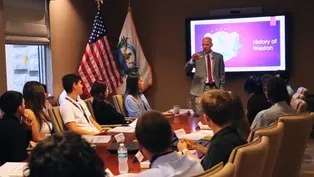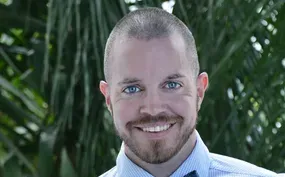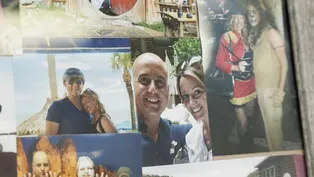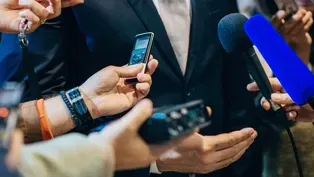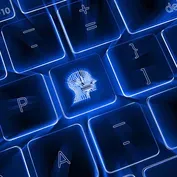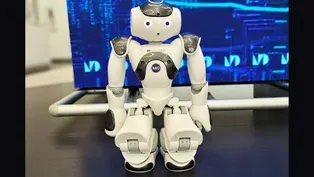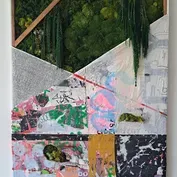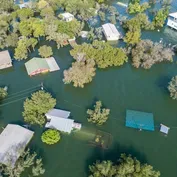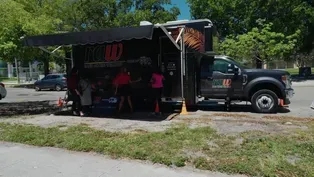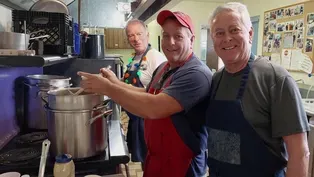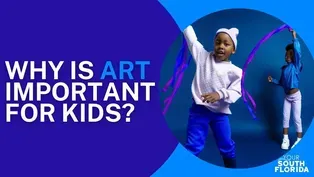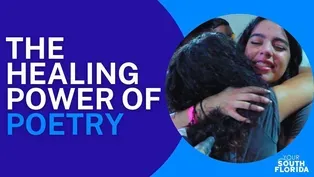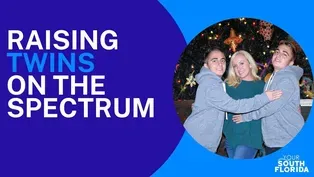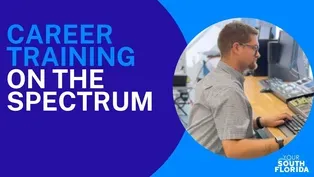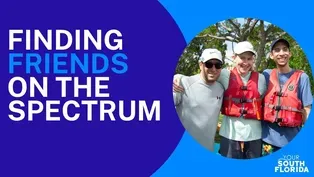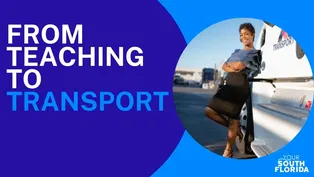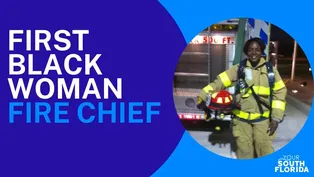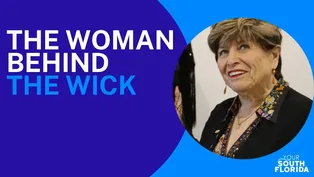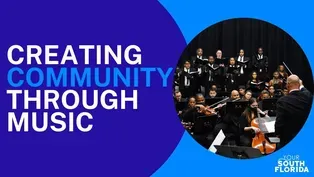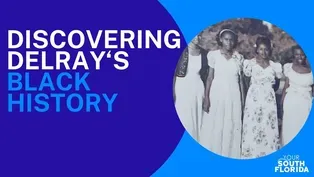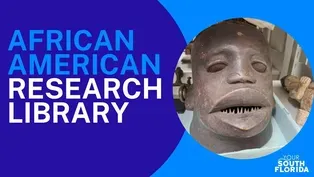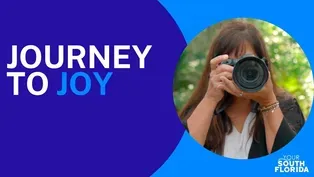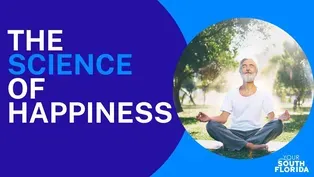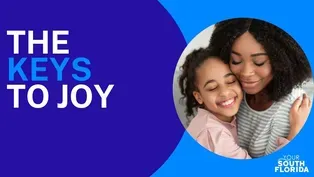Your South Florida
FAU Researchers Test AI Limits & Risks
Clip: Season 8 | 10m 13sVideo has Closed Captions
FAU students & researchers are using the power of AI to develop innovative ways to study the brain.
In Palm Beach County, Florida Atlantic University students & researchers are using the power of AI to develop innovative ways to study the brain while also examining the long-term implications of AI.
Problems with Closed Captions? Closed Captioning Feedback
Problems with Closed Captions? Closed Captioning Feedback
Your South Florida is a local public television program presented by WPBT
Your South Florida
FAU Researchers Test AI Limits & Risks
Clip: Season 8 | 10m 13sVideo has Closed Captions
In Palm Beach County, Florida Atlantic University students & researchers are using the power of AI to develop innovative ways to study the brain while also examining the long-term implications of AI.
Problems with Closed Captions? Closed Captioning Feedback
How to Watch Your South Florida
Your South Florida is available to stream on pbs.org and the free PBS App, available on iPhone, Apple TV, Android TV, Android smartphones, Amazon Fire TV, Amazon Fire Tablet, Roku, Samsung Smart TV, and Vizio.
Providing Support for PBS.org
Learn Moreabout PBS online sponsorshipIn Palm Beach County, Florida, Atlantic University students and researchers are using their power of AI to develop innovative ways to study the brain, while also examining the long term implications of AI.
Here to share more on that is Doctor Ellen Barenholtz, co-founder of Force Machine Perception and Cognitive Robotics Lab and associate director of four center for the Future Mind.
Thank you so much for joining us.
How interesting.
Thank you for having me.
I really appreciate it.
Absolutely.
So tell us some of the research being done at the MPCa lab and the lab's mission.
Your research focuses in particular is interesting.
You're using robots to understand how the brain works.
Yes.
So the lab was founded really in the early stages of this beginning of this revolution, out of artificial intelligence.
And we realized very quickly that the broad range of applications of this new technology weren't really being explored as optimally, because the technology was kind of living in, in computer science and in engineering.
And my home is in science and the data generating fields.
And the purpose of the lab was to actually form a kind of a nexus.
How could we take this incredible, revolutionary new technology and apply it to, uh, problems that are of interest to scientists and to health-related fields?
The lab really was this this kind of a new experiment in taking a brand new technology.
That's that was that people are still trying to understand its limitations and its capabilities and handing it off to, uh, scientists and students from across a broad, diverse range of different fields.
Um, so we would we're brought in students from biology, chemistry, psychology, neuroscience and teamed up with other faculty to see whether this technology could actually be applied to, to diverse areas that that traditional techniques might not be effective at at looking at.
(Arlene) Ethics is a big issue when it comes to this type of research.
Talk about AI and how do you navigate this.
Obviously there's benefits, but there could also be some challenges in some.
(Elan) Ways what we have now is an intelligence that is very human like for the first time, these are computers that can really understand language, think like humans, reason, plan.
And people worry if these things are going to in some ways usurp human jobs and human purpose.
That's one ethical consideration that people are concerned with, my personal opinion and our philosophy in the lab is that although this is a disruptive technology, and it's certainly going to change the way people operate and work, it's actually going to facilitate.
It's going to make people more efficient.
It's going to allow them to do things that are more interesting and creative.
Think back to accounting.
You know, before Excel and before spreadsheets, you had to have a human uh, do every single calculation in a row.
Now, we can, of course, apply computers to do those kind of laborious tasks.
This is something very similar in some ways.
Instead of having to read through an article painstakingly and take notes on every single detail, you can ask the artificial intelligence to find the relevant information and to summarize that information for you.
So one, I don't personally believe that we're talking about the replacement of humans.
Instead, we're seeing an enhancement of humans.
Another ethical issue is the misuse and potential abuse of these technologies.
And again, my philosophy here is that, of course, these are powerful tools, and we do need to be concerned about them being used improperly and incorrectly.
However, the best defense against that is for us to hand off this technology to the people who are going to use it for good purposes.
And that's really the foundational principle of why our lab was founded.
We're taking scientists and health related officials and individuals and telling them and providing them with the capacity to use technology to build something amazing, to try to cure diseases, to do diagnosis, and to come up with technologies that can help people.
(Arlene) Let's talk about the research teams who work so hard.
The academic background.
What do they come?
Where do they come from?
How impactful is it having a multidisciplinary approach when it comes to this type of research?
(Elan) We have people who come from computer science naturally, but also from biology, psychology, neuroscience and also epidemiology is one area that I've been particularly focused on for the past few years.
And this leads to a kind of an interesting environment in which people with very diverse, uh, skill sets and very diverse knowledge bases are all coming together and looking at the same core technology, but trying to understand different kinds of problems.
(Arlene) So students who are involved and immersed in all this, I'm wondering, what do they do in the future?
How do they use this knowledge for their own career path?
I like to think that historically we have had a tremendous a really successful track record in placing students in really wonderful future career paths.
Students have gone on to very prestigious institutions Stanford, MIT, and also moved on to companies like Twitter and Facebook.
And some have also gone on to start up startups and founded individual companies.
And the reason they've had such success is because they are given an advantage of what's turning out to be.
I think it goes without saying one of the most, if not the most important technological advances of our lifetime, if not the past century.
And so the advantage of learning about and becoming expert in this technology and specifically learning how to how this technology applies to a particular domain and a particular field, is where the lab really has shown tremendous success.
We have this notion of sort of skipping the line, uh, typically in order to become a professional in artificial intelligence, you usually have to go through a very extensive training programs all the way up through a master's, certainly, and maybe even a PhD in computer science.
And our philosophy is we will give you the tools, uh, here's the the meat and potatoes of how these, these systems work, how you apply them to data.
Now go off and do something with it.
Take it to the data that you care about, whatever your particular passion is, whether it's in biology, chemistry or neuroscience, social media, whatever the case may be, or even some commercial application.
We provide people with that ticket to go and take this, this red-hot technology and apply it in their specific areas.
(Arlene) It certainly sounds like they're ahead of the game learning what they're learning far ahead of the curve.
Um Four also has the Gruber AI sandbox, which houses a center for the future mind.
Talk to us about what the sandbox is and how it fits into your work.
(Elan) It's the sandbox was, uh, was actually the product of a couple of different things coming together.
Uh, Ruben Gruber, who is the inspiration for the sandbox it carries his name, saw that there was something special happening in our lab where these students from very diverse backgrounds and faculty were getting together and thinking about some of these very cutting edge problems using this new technology and thinking very innovatively.
And he had the vision to bring all these different kinds of people together, and to think about how we can inspire both scientific research and innovation, and also potential entrepreneurship.
And the sandbox is a place that the houses, as you mentioned, the center for Future Mind.
It also houses our lab, the Machine Perception and Cognitive Robotics lab, and it is its own entity in some ways that houses these completely different pieces.
And the goal of the sandbox is to bring together all of these things, both the research.
People who are knee deep in the computation, who know how to build artificial intelligence systems are getting together with people who are thinking about entrepreneurship.
How do we take the discoveries and the products of the lab and turn them into potentially into life changing health advances, things that could actually be brought to market and make the kind of impact that only really commercial applications can end up doing.
And of course, this has implications not only for the discoveries, but for the students themselves who can go out and into the world and potentially found companies and bring these things to the world.
Um, the center for Future Mind is kind of a think tank whose job it is to think about the broader implications.
What does it mean to have artificial intelligence systems that maybe are even going to surpass human intelligence?
What is that going to mean for the future of humanity?
(Arlene) Absolutely.
And that being said, how do you convince people that they can trust AI and use it to their advantage?
(Elan) So like, like any technology, I think what's really critical here is we don't we shouldn't be afraid of the capabilities of this technology.
What we need to be concerned with is making sure that the right people and the right mindset is being used.
That when although these are powerful tools and tools that we don't fully understand yet, ultimately it really comes down to people.
People's intentions and goals as they're developing and applying these tools.
And that's really the founding principle of the sandbox and of the lab, is that we need to get this incredibly powerful technology into the right hands.
People are going to use it to create cures for diseases.
People are going to use it for diagnostics.
People are going to use it to create products that are going to help people and bring something wonderful into the world.
(Arlene) Powerful tools in the right hands, indeed.
Thank you, Doctor Barinholtz, for joining us today.
We appreciate it.
(Elan) Thank you.
It was a pleasure talking to you.
Support & Food for Broward Seniors and Grandfamilies in Need
Video has Closed Captions
In Broward County, many seniors are facing food insecurity. (7m 51s)
Palm Beach County Food Bank’s Critical Role in Fighting Food Insecurity
Video has Closed Captions
The PBC Food Bank works to provide nutritious meals and vital support. (9m 26s)
How Rescuing Food Supports Families & Fights Climate Change
Video has Closed Captions
Each year, millions of pounds of food are wasted while many South Floridians face hunger. (9m 57s)
Protecting the Everglades with the Miccosukee Tribe
Video has Closed Captions
For the Miccosukee Tribe, the Everglades is more than just land; it’s a vital part of their identity (8m 32s)
Inside Miccosukee Culture & History
Video has Closed Captions
Pam Giganti interviews William ‘Popeye’ Osceola and Talbert Cypress about the Tribe’s history. (11m 10s)
Transforming The Glades Through Leadership and Community Engagement
Video has Closed Captions
A program by the Belle Glade Chamber of Commerce brings people together to address community issues. (7m 16s)
How FIU Honors Mayor Ferré’s Legacy
Video has Closed Captions
FIU’s Maurice A. Ferré Institute for Civic Leadership helps to create a more engaged community. (8m 4s)
Go Inside the Program Turning High Schoolers Into Civic Game-Changers
Video has Closed Captions
The City of Weston is educating high school students about the inner workings of local government. (7m 56s)
Spotting Suicide Warning Signs: What You Need to Know to Help Someone in Crisis
Video has Closed Captions
Alan Mednick joins us in studio to share how to talk about the warning signs for suicide. (9m 18s)
From Darkness to Light: A Journey to Self-Acceptance & Mental Wellness
Video has Closed Captions
Watch the inspiring story of Caiden Smith's journey to self-Acceptance & mental wellness. (8m 13s)
Emotional Support & Resources for Loved Ones Left Behind After Suicide
Video has Closed Captions
The aftermath of a suicide can be an overwhelming and traumatic experience for those left behind. (8m 8s)
TIPS to Navigate AI Tech in Media
Video has Closed Captions
Susan Jacobson gives us her take on the role of AI in the industry and tips for students. (9m 39s)
FAU Researchers Test AI Limits & Risks
Video has Closed Captions
FAU students & researchers are using the power of AI to develop innovative ways to study the brain. (10m 13s)
Discover the Latest AI Programs @ Miami Dade College
Video has Closed Captions
Miami Dade College is diving head-first into AI with programs for all interest levels. (7m 49s)
Video has Closed Captions
Trees are vital to keeping our neighborhoods cool. (7m 7s)
Video has Closed Captions
The threat of flooding is becoming the new normal in South Florida, well outside of Hurricane Season (12m 25s)
Video has Closed Captions
As temperatures rise, it’s important to protect your pets too. (3m 40s)
Video has Closed Captions
Prolonged exposure to extreme heat poses many health risks. (4m 48s)
New Magazine Creates Stronger Community for South Florida's LGBTQ+ Women
Video has Closed Captions
Women owned SkirtSoFLo is a new magazine made for the South Florida LGBTQ+ women’s community. (6m 7s)
Mobile Units Brings Life-Saving HIV Healthcare into At-Risk Communities
Doctors from the University of Miami are creating more equitable approaches to HIV prevention & care (12m 44s)
A Beacon of Hope for Ft. Lauderdale's LGBTQ+ Community
Video has Closed Captions
For 70 years the Church of Christ Fort Lauderdale has been known for its inclusivity. (7m 2s)
How The Arts Help Child Behavior
Video has Closed Captions
Studies show that kids engaged in the arts have fewer problems interacting with others. (11m 44s)
How Poetry Can Provide Comfort and Boost Your Mood
Video has Closed Captions
Research shows that poetry can provide comfort and boost mood during periods of stress and trauma. (8m 13s)
Single Mom Gives Hope to Autism Families & TIPS to Navigate Resources l Your South Florida
Video has Closed Captions
Mom Candi Spitz knows all about the difficulties in navigating autism resources. (7m 35s)
New Higher Ed Program Gives Students with Autism a Chance at Independence l Your South Florida
Video has Closed Captions
Many adults with autism face significant barriers to finding gainful employment. (7m 27s)
Creating Safe Spaces & Friendships for Adults with Autism l Your South Florida
Video has Closed Captions
The Social Cog is creating safe spaces for young adults on the autism spectrum. (10m 51s)
Transporter Trudie Ives Talks Business & Helping Women
Video has Closed Captions
Trudie Ives discovered the world of transportation and hasn’t looked back. (9m 41s)
Fire Chief Trailblazer Samantha Whitehorne
Video has Closed Captions
Samantha Whitehorne is a fire chief for the Broward Sheriff’s Office. Watch her story. (6m 29s)
Backstage at THE WICK with Business Maven Marilynn Wick
Video has Closed Captions
Marilynn Wick has spent her life blazing a trail in the business world. (7m 43s)
Showcasing Classical Music from the African Diaspora
Video has Closed Captions
In 2021, Portia Dunkley co-founded the New Canon Chamber Collective. (11m 18s)
African American Research Library and Cultural Center
Video has Closed Captions
Take a tour of Broward County’s African American Research Library and Cultural Center. (7m 40s)
Local Photographer Shares Her Journey to Finding Joy
Video has Closed Captions
Sonya Prather set off on a journey of self-discovery that has enabled her to find true joy (7m 14s)
Happiness Coach Rob Mack on Positive Psychology & Happiness
Video has Closed Captions
Author Robert Mack and host Arlene Borenstein discuss Positive Psychology. (9m 37s)
Expert TIPS to Finding Your Joy from Author Lisa McCourt
Video has Closed Captions
Author Lisa McCourt gives tips to finding true joy in your life. (11m 11s)
Providing Support for PBS.org
Learn Moreabout PBS online sponsorshipYour South Florida is a local public television program presented by WPBT

